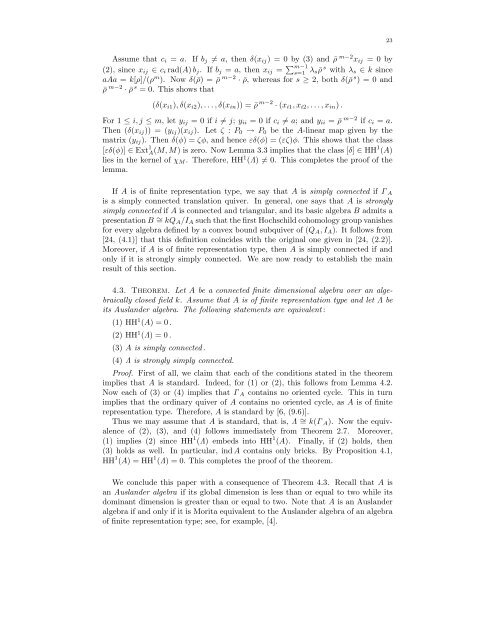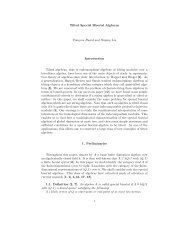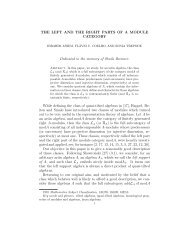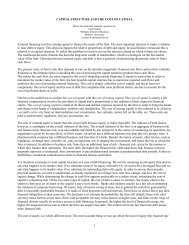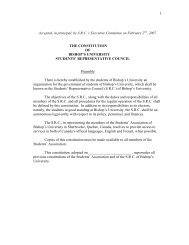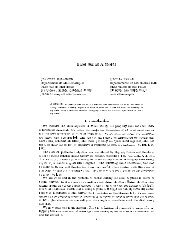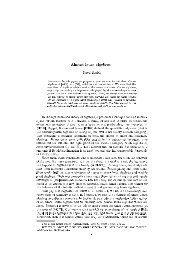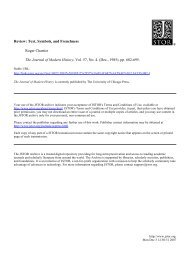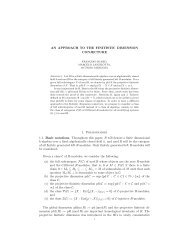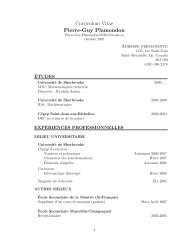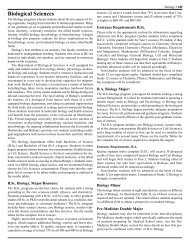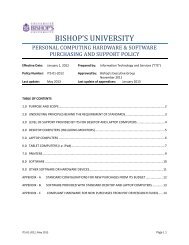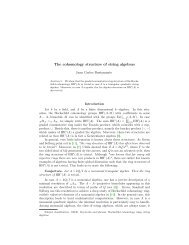Hochschild Cohomology and Representation-finite Algebras Ragnar ...
Hochschild Cohomology and Representation-finite Algebras Ragnar ...
Hochschild Cohomology and Representation-finite Algebras Ragnar ...
You also want an ePaper? Increase the reach of your titles
YUMPU automatically turns print PDFs into web optimized ePapers that Google loves.
23<br />
Assume that c i = a. If b j ≠ a, thenδ(x ij ) = 0 by (3) <strong>and</strong> ¯ρ m−2 x ij =0by<br />
(2), since x ij ∈ c i rad(A) b j . If b j = a, thenx ij = ∑ m−1<br />
s=1 λ s ¯ρ s with λ s ∈ k since<br />
aAa = k[ρ]/(ρ m ). Now δ(¯ρ) =¯ρ m−2 · ¯ρ, whereasfors ≥ 2, both δ(¯ρ s )=0<strong>and</strong><br />
¯ρ m−2 · ¯ρ s = 0. This shows that<br />
(δ(x i1 ),δ(x i2 ),...,δ(x in )) = ¯ρ m−2 · (x i1 ,x i2 ,...,x in ) .<br />
For 1 ≤ i, j ≤ m, lety ij =0ifi ≠ j; y ii =0ifc i ≠ a; <strong>and</strong>y ii =¯ρ m−2 if c i = a.<br />
Then (δ(x ij )) = (y ij )(x ij ). Let ζ : P 0 → P 0 be the A-linear map given by the<br />
matrix (y ij ). Then δ(φ) =ζφ, <strong>and</strong> hence εδ(φ) =(εζ)φ. This shows that the class<br />
[εδ(φ)] ∈ Ext 1 A(M,M) is zero. Now Lemma 3.3 implies that the class [δ] ∈ HH 1 (A)<br />
lies in the kernel of χ M . Therefore, HH 1 (Λ) ≠ 0. This completes the proof of the<br />
lemma.<br />
If A is of <strong>finite</strong> representation type, we say that A is simply connected if Γ A<br />
is a simply connected translation quiver. In general, one says that A is strongly<br />
simply connected if A is connected <strong>and</strong> triangular, <strong>and</strong> its basic algebra B admits a<br />
presentation B ∼ = kQ A /I A such that the first <strong>Hochschild</strong> cohomology group vanishes<br />
for every algebra defined by a convex bound subquiver of (Q A ,I A ). It follows from<br />
[24, (4.1)] that this definition coincides with the original one given in [24, (2.2)].<br />
Moreover, if A is of <strong>finite</strong> representation type, then A is simply connected if <strong>and</strong><br />
only if it is strongly simply connected. We are now ready to establish the main<br />
result of this section.<br />
4.3. Theorem. Let A be a connected <strong>finite</strong> dimensional algebra over an algebraically<br />
closed field k. Assume that A is of <strong>finite</strong> representation type <strong>and</strong> let Λ be<br />
its Ausl<strong>and</strong>er algebra. The following statements are equivalent :<br />
(1) HH 1 (A) =0.<br />
(2) HH 1 (Λ) =0.<br />
(3) A is simply connected .<br />
(4) Λ is strongly simply connected.<br />
Proof. First of all, we claim that each of the conditions stated in the theorem<br />
implies that A is st<strong>and</strong>ard. Indeed, for (1) or (2), this follows from Lemma 4.2.<br />
Now each of (3) or (4) implies that Γ A contains no oriented cycle. This in turn<br />
implies that the ordinary quiver of A contains no oriented cycle, as A is of <strong>finite</strong><br />
representation type. Therefore, A is st<strong>and</strong>ard by [6, (9.6)].<br />
Thus we may assume that A is st<strong>and</strong>ard, that is, Λ ∼ = k(Γ A ). Now the equivalence<br />
of (2), (3), <strong>and</strong> (4) follows immediately from Theorem 2.7. Moreover,<br />
(1) implies (2) since HH 1 (Λ) embeds into HH 1 (A). Finally, if (2) holds, then<br />
(3) holds as well. In particular, ind A contains only bricks. By Proposition 4.1,<br />
HH 1 (A) =HH 1 (Λ) =0. This completes the proof of the theorem.<br />
We conclude this paper with a consequence of Theorem 4.3. Recall that A is<br />
an Ausl<strong>and</strong>er algebra if its global dimension is less than or equal to two while its<br />
dominant dimension is greater than or equal to two. Note that A is an Ausl<strong>and</strong>er<br />
algebra if <strong>and</strong> only if it is Morita equivalent to the Ausl<strong>and</strong>er algebra of an algebra<br />
of <strong>finite</strong> representation type; see, for example, [4].


